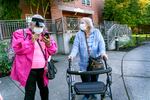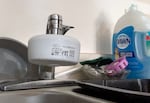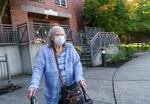For 10 months, Janice Lopez has been taking cold showers.
If the water is too warm, it will turn to fine mist. And that vapor, she believes, could kill her if she breathes in too much.
On Sept. 27, she says, it almost did.
The 66-year-old had returned home from a grocery trip the day before feeling unusually sluggish. Her boyfriend found her collapsed on her bedroom floor the next morning, naked and unconscious. Paramedics carried her out of the room on a bedsheet.

It took three years for Donna Duran, right, 82, to be get an apartment in the senior affordable housing complex at Rosemont Court in North Portland. An outbreak of Legionnaires’ Disease at Rosemont has killed one resident and sickened many others, forcing residents like Duran to seek other affordable housing. Her caretaker Shelley Jackson, 71, left, searches her phone to find information on relocation information provided by building owners Northwest Housing Alternatives.
Kristyna Wentz-Graff / OPB
At the hospital, Lopez didn’t need to be told her diagnosis. She already knew. It was Legionella pneumonia, the same infection that had killed one of her neighbors and is believed to have sickened a dozen more.
In January, Rosemont Court, an affordable housing complex for seniors in North Portland, saw its first residents fall sick with Legionnaires’ Disease, an illness spread by bacteria in tiny water droplets. The county confirmed six cases and suspected four others based on symptoms. By June, another three seniors had gotten sick. Leaders with Northwest Housing Alternatives, a nonprofit that owns the building, said they would pay residents’ relocation costs while they worked to find the source of the outbreak.
But some seniors say Northwest Housing Alternatives and the company that runs the building, Income Property Management, haven’t addressed the real problem: they can’t afford to live anywhere else.
Months before Lopez fell ill, she began looking to leave the building, frightened by what was happening to her neighbors. Everywhere she found either had a years-long waitlist or was charging double or triple her current rent of $380 a month. Often, it was both. (Northwest Housing Alternatives receives a federal tax credit to keep Rosemont Court affordable for low-income seniors. Lopez pays about half of what she brings in through her monthly disability and social security payments)
Her case is common. Experts say the wait times for permanent affordable housing for seniors in the region range between two to five years.
Caught between an affordable housing crisis and a public health one, seniors like Lopez say they are stuck at Rosemont Court — now home to one of the largest and longest-lasting Legionnaires’ outbreaks in Multnomah County history.
“I just feel like it’s going to follow me until I get out of here,” Lopez said.
The bacteria
Typically, people only hear about Legionnaires’ Disease when there’s an outbreak on a cruise ship or a nursing home. In reality, the bacteria is commonly found in low concentration in fresh water. Most healthy people who inhale the bacteria never know.
That’s part of what makes the source of an outbreak so hard to find — the bacteria is everywhere.

An outbreak of Legionnaires’ Disease at Rosemont Court in North Portland has killed one resident and sickened many others, forcing residents to seek other affordable housing.
Kristyna Wentz-Graff / OPB
The colony sickening Rosemont Court residents has proven particularly elusive. Ten months after the first case was reported to Multnomah County health officials, regulators said they believe the outbreak is limited to the building. But they still don’t know precisely where the bacteria is coming from within the complex, a collection of studio, one bedroom and two bedroom apartments.
The organisms cluster and multiply in places where water stagnates such as a water tank or pipe. As the colony grows, chunks can break off and flow into residents’ homes through tap faucets or shower heads.
Michele Swanson, a professor of microbiology and immunology at the University of Michigan, said it’s common for health officials to struggle to find the source of an outbreak. In 25 years studying Legionnaires’, Swanson said she’s heard of outbreaks that stretch anywhere from months to decades.
In these cases, health experts will often treat the water in a building with chlorine to knock down the number of bacteria. But the colonies can be stubborn — due, in part, to a thick outer shell the organisms grow that shield them from the treatment. Within a few months, the population will start to grow back. In a notorious years-long outbreak in an Illinois veteran’s home beginning in 2015, officials gave up on tinkering with the plumbing and demolished the dorms. By then, 14 residents had died.
Older people with weakened immune systems are much more likely to get sick with a severe type of pneumonia. Roughly one in 10 people who get sick with the disease will die.
Swanson said that if her family members were living in a senior home like Rosemont, she would not let them wait around for the outbreak to be resolved.
“I would get them out of there,” she said.
Safety steps
County health officials, the Portland Water Bureau, and the building owner all say they’re trying to keep the property as safe as possible for the seniors living there. They have emptied the water lines, installed special filters to showerheads and faucets, and added chlorine and a new disinfecting system. A notice posted inside the building’s elevator from February informs residents that the treatment is “almost certainly more than sufficient to make sure your home was safe.”

An outbreak of Legionnaires’ Disease at Rosemont Court in North Portland has killed one resident and sickened many others, forcing residents to seek other affordable housing. Special filters were installed on shower heads and faucets bu the bacteria continues to sicken residents.
Rebecca Ellis / OPB
But the building still isn’t safe. Roughly one month after the notice in the elevator went up, resident Lawrence Parker was treated for Legionnaires’ for the second time.
His first case, one of the earliest at Rosemont Court, was diagnosed in January. Parker, 77, said he was hospitalized for two-and-half months. While he was in the hospital, the county moved about 100 of his neighbors to hotels while they tried to trace the outbreak.
By March, Parker and the rest of the seniors had returned to Rosemont Court. Within a month, he had been diagnosed again with Legionnaires’.
“I experienced death real close. I got real sick. Hallucinations,” Parker said. “I don’t want to go through that again.”
Trell Anderson, executive director of Northwest Housing Alternatives, said he too wants residents out of Rosemont Court. In an emailed statement, Anderson said the nonprofit has “made it clear that it is in their best interest to relocate as quickly as possible.” A spokesperson for Anderson declined to make him available for an interview.
“Despite best efforts to identify the source of the bacteria and mitigate the situation, we are very concerned that this continues to happen,” Anderson wrote.
To that end, the nonprofit said it is providing residents money to relocate — $2,900 for people living in a studio apartment. $3,300 for a one bedroom, and $4,200 for a two bedroom. That’s the same amount the nonprofit would be required by city law to pay if it was forcing residents to leave. (Because the moves are considered voluntary, they’re not bound by the city’s relocation assistance rules.)
Northwest Housing Alternatives said they’ve also retained DVV Consulting Services to help residents move. The consulting firm visits Rosemont Court once a week and sends out a weekly newsletter with available rentals. It also helps transport residents to visit potential units.
A tight rental market
But Rosemont Court seniors say there are more of them desperate to leave than available homes.
Oregon has a severe shortage of affordable housing. According to the National Low Income Housing Coalition, the state needs roughly 100,000 more of these units to house all the low-income families that need shelter. (A low-income household, according to the coalition, is one who brings in 30% of the area median income or less.)
“I can’t afford to move no place else,” said Parker, who currently pays about $1,000 in monthly rent for his apartment — or about $400 less than the average rent for a Portland one-bedroom. “There’s nothing out there for me.”

It took three years for Donna Duran, 82, to be get an apartment in the senior affordable housing complex at Rosemont Court in North Portland. An outbreak of Legionnaires’ Disease at Rosemont has killed one resident and sickened many others, forcing residents like Duran to seek other affordable housing.
Kristyna Wentz-Graff / OPB
Caretaker Shelley Jackson has been looking for a new home for resident Donna Duran since January. As a 71-year-old aide who spends her days at Rosemont running showers and washing dishes, Jackson says she was concerned for her own health as well as that of the frail 82-year-old in her care. She recently asked for a special kind of Section 8 voucher that would allow Duran to move immediately. She said she was rejected.
“They’re saying if she’s not dying, then I can’t do that,” Jackson said.
In June, Anderson with Northwest Housing Alternatives said roughly half of the complex’s 95 residents had expressed an interest in moving. So far, he said, just 16 residents have left. Two more are expected to leave next month.
Lopez still hopes to find a new home. She has her name on a few lists for affordable housing complexes in Washington County. Officials there told her to expect about a wait between two to five years.
In the meantime, Lopez said she’s starting to regain some of her energy. She’ll soon return to washing dishes with a mask and cooking with bottled water. She’s back to taking cold showers.
“If I got it once, I can get it again,” she said.
